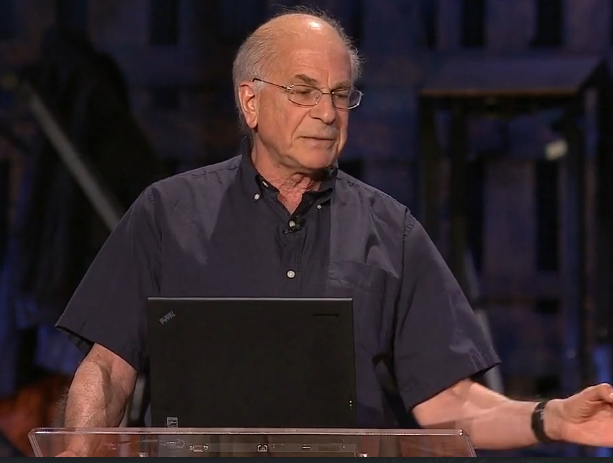(单词翻译:单击)
演讲文本
I mean, most of the moments of our life --
我们生活中的大多片刻--
and I calculated, you know, the psychological present is said to be about three seconds long;
我算了算--从心理学角度来说仅仅只是三秒长。
that means that, you know, in a life there are about 600 million of them;
这意味着人一生中大约有六亿个片刻。
in a month, there are about 600,000 -- most of them don't leave a trace.
一个月里则大约有六十万个片刻。它们大多不留痕迹。
Most of them are completely ignored by the remembering self.
大多数皆被记忆自我全然忽视了。
And yet, somehow you get the sense that they should count,
然而,你现在亦应发现一些感觉被储存,
that what happens during these moments of experience is our life.
因为我们经验中的每分每秒合在一起就构成了我们的人生。

It's the finite resource that we're spending while we're on this earth.
只要我们活着,我们就会消耗这些有限的资源。
And how to spend it would seem to be relevant,
该如何使用它们似乎是很重要的,
but that is not the story that the remembering self keeps for us.
但这不是记忆自我所留给我们的故事。
So we have the remembering self and the experiencing self, and they're really quite distinct.
因此记忆自我和经验自我是很好区别的。
The biggest difference between them is in the handling of time.
他们之间的最大不同是在于处理时间的方式。
From the point of view of the experiencing self, if you have a vacation,
就经验自我而言,如果你有一个假期,
and the second week is just as good as the first,
第二周和第一周同等快乐,
then the two-week vacation is twice as good as the one-week vacation.
那么两周下来快乐的分量是一周假期的两倍多。
That's not the way it works at all for the remembering self.
然而记忆自我则不是这样算的。
For the remembering self, a two-week vacation is barely better than the one-week vacation
对记忆自我来说,两周假期并不比一周假期多多少,
because there are no new memories added.
因为期间没有任何新记忆的加入。
You have not changed the story.
故事的剧情依然如旧。
视频及简介
演讲简介:
通过使用休假和胃肠镜检查的例子,诺贝尔奖获得者及行为经济学创始者丹尼尔·卡纳曼向我们揭示了“经验自我”和“记忆自我”是如何使用不同角度来理解快乐。这一新见解将会对经济领域、公共政策领域以及我们的自我意识产生深远的影响。


